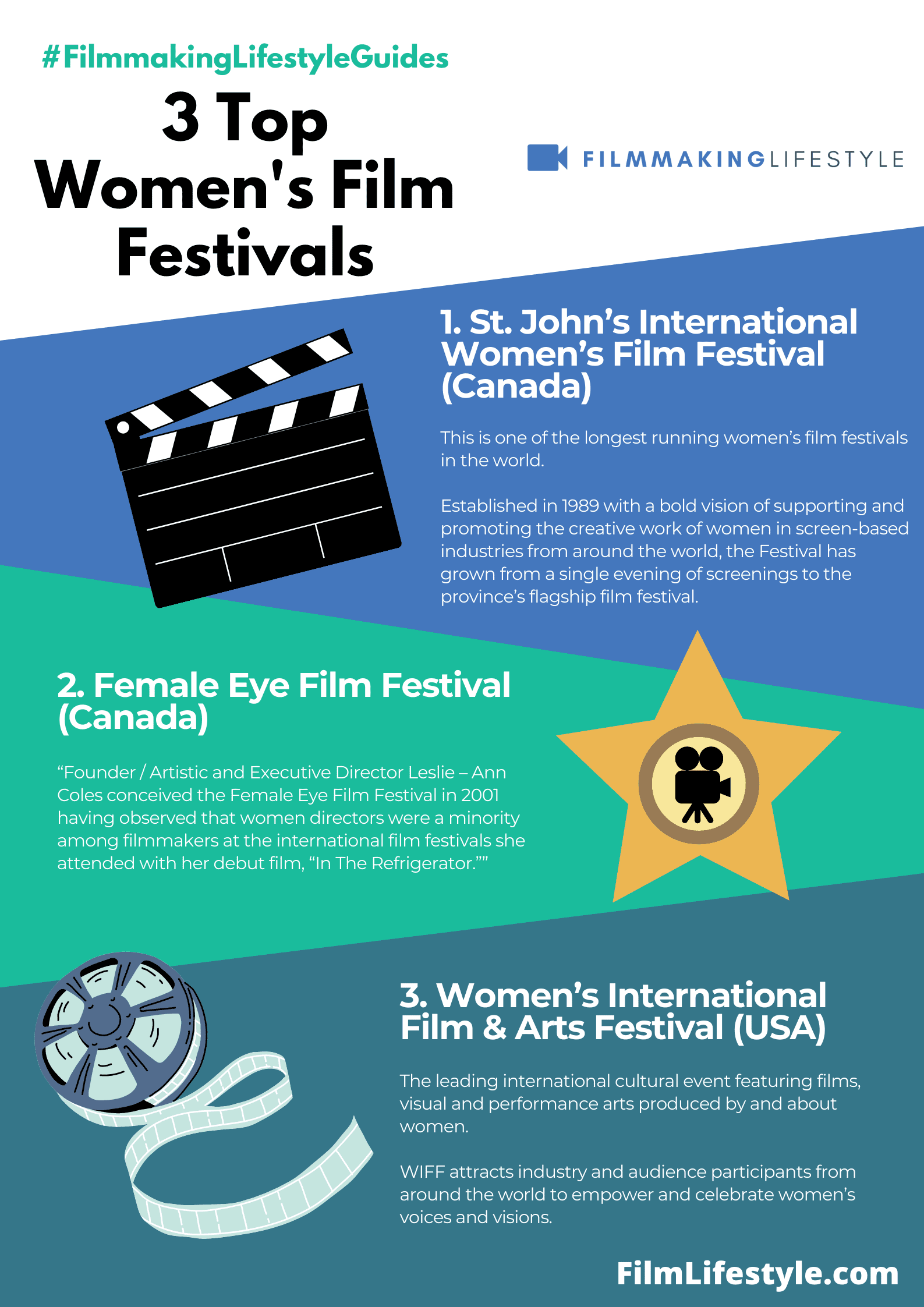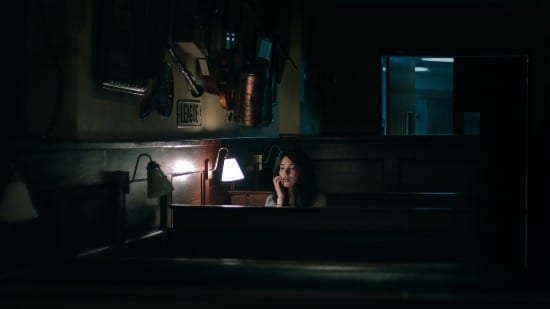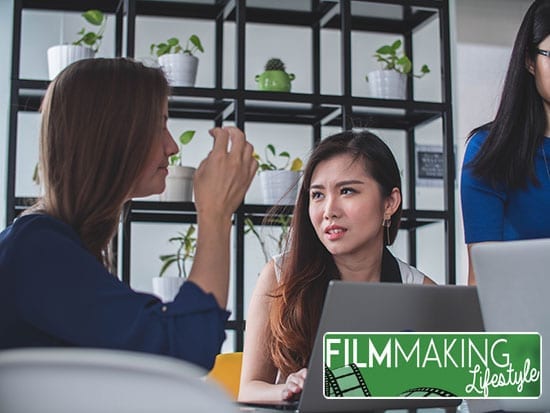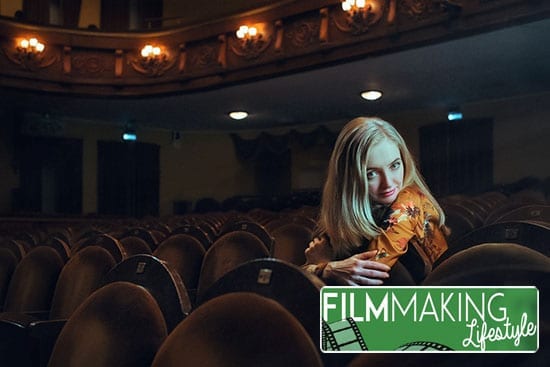So you’ve finished that film and you’re considering entering it in a women’s film festival? But with so many women’s film festivals out there, how do you choose the right one?
We’ve put together a list of women’s film festivals from all over the world. This is a list of the top women’s film festivals, whether for prestige, potential exposure, or overall coolness, if you can get into these you’re well on your way.
Our best advice for getting into a film festival is to:
- Do a lot of research about the festival you’re looking at. Check the small print!
- Use a festival submission service like Withoutabox.
- Complete all the forms effectively and don’t miss anything out. There’s nothing that film festivals dislike more than people who don’t follow the instructions!
WOMEN’S FILM FESTIVALS
What Are Women’s Film Festivals?
Women’s film festivals have been around for decades, but they’ve only recently gotten the recognition that they deserve.
These amazing festivals are full of diverse and interesting films by female directors from all over the world.
Most women’s film festivals are focused on showcasing films made by women, though some do include films directed or written by men as well.
The first-ever solely women’s film festival was held in 1991 with a focus on filmmakers who had not received proper exposure outside their home country.
The festival has since grown to become one of the most important events in cinema calendar – highlighting more than 800 movies from 70 different countries!
The Top Women’s Film Festivals
So, without further ado, here’s our list of the 19 of the best women’s film festivals from around the world.
St. John’s International Women’s Film Festival (canada)
“The St. John’s International Women’s Film Festival (SJIWFF) is one of the longest-running women’s film festivals in the world.
Established in 1989 with a bold vision of supporting and promoting the creative work of women in screen-based industries from around the world, the Festival has grown from a single evening of screenings to the province’s flagship film festival.
Operating year-round, the SJIWFF is known for a diverse program of independent film screenings, high-calibre workshops and masterclasses, international film forums, hands-on youth filmmaking camps, career-accelerating mentorship programs and of course, advocacy work in the movement for gender diversity in our industry.
Every year the Festival receives over 600 film submissions and from those we present a powerful program of international documentaries, short films and feature works for the signature five-day annual Festival.
Festival week also features the Film Industry Forum, consisting of panels, workshops and face-to-face meetings for filmmakers, producers, and interactive creators.
The Forum focuses on the business of filmmaking while the Festival celebrates international works by women.”
Female Eye Film Festival (canada)
“Founder / Artistic and Executive Director Leslie – Ann Coles conceived the Female Eye Film Festival in 2001 having observed that women directors were a minority among filmmakers at the international film festivals she attended with her debut film, “In The Refrigerator.””
Women’s International Film & Arts Festival (USA)
“The Women’s International Film & Arts Festival (WIFF) is the leading international cultural event featuring films, visual and performance arts produced by and about women.
WIFF attracts industry and audience participants from around the world to empower and celebrate women’s voices and visions.
The Festival provides opportunities for industry professionals to network, hone their skills and showcase their work through screenings, lectures, discussions, workshops and the chance to meet industry peers from around the world.
WIFF is generally hosted each year in Miami, Florida. The event recently moved to a thrilling new destination: New York City.
WIFF also hosts year-round screenings and events in the South Florida area, including Palm Beach, Broward and Miami-Dade Counties.”
Moondance International Film Festival (USA)
“Moondance is known as the Film Festival Without Borders, and features the very best of indie films from the US and around the world. Come join us to be entertained, encouraged and inspired, at this annual world-class event
The Moondance International Film Festival has invited talented US and International filmmakers, writers and music composers to submit their films, written works and film scores to its annual competition season.
Moondance celebrates, encourages, inspires, and supports original independent films, written works and music, not just during our film festival, but throughout the year, and screens the very best in independent cinema to enthusiastic audiences from the US and around the world.
The secret to our international success and longevity can be directly attributed to upholding our founding principles, goals, values, unimpeachable integrity, and our unique mission.
We have always made a concerted effort to inspire talented filmmakers, writers, composers, attendees and audiences, locally and globally.
Maintaining the Moondance reputation for top-quality indie films, written works and original music has always been the first priority.
Our valued sponsors, donors, supporters, friends of the Moondance, as well as our professional staff, competition entrants, workshop & master class presenters, keynote speakers, audiences and festival attendees, are integral elements of our long-term success.”
Another Experiment By Women Film Festival (USA)
“Another Experiment by Women Film Festival (AXW) is a film festival founded in New York City in 2010 by Lili White. AXW promotes and screens women’s experimental films, many of which feature underrepresented themes and issues distinct to women and girls.
Lili White, an avant-garde filmmaker who is a graduate of the Pennsylvania Academy of Fine Arts, was inspired to create the AXW after showing her work on a Manhattan Neighborhood Network community TV show—EYE:AM—curated by Victoria Kereszi.
She was impressed by Kereszi’s dedication to showing women’s work, which White believed was underrepresented, and generally invisible to the public and not usually seen outside of academic or film society realms.
White approached Kereszi with her the idea of creating a festival that would provide a stage for women experimental creators, and also foster a community, which she deemed both needful and lacking.
The first festival took place in the autumn of 2010, curated by White. The festival later became a Fractured Atlas Fiscally Sponsored Campaign and a recipient of a 2011 Lower Manhattan Cultural Council MCAT Arts Fund Grant.
The festival screens groupings of films in Manhattan; each grouping of films is designed to speak to a shared underlying topic.
In addition to screenings, the festival organization maintains an archive, a blog and a curated list of short films available for viewing online.
Women’s International Film Festival In Seoul (south Korea)
“SEOUL International Women’s Film Festival (SIWFF, previously International Women’s Film Festival in Seoul, IWFFIS) is an annual film festival held in Seoul, South Korea.
The first festival took place on April 1, 1997, which marked the second appearance of the international film festival in Korea following Busan International Film Festival launched in 1996.
This was a time when there was not a clear idea on how to define a film festival. During this time, SEOUL International Women’s Film Festival came up with the catchphrase “See The World Through Women’s Eyes.This phrase set its main goal to introduce women’s films that explore “women’s reality from the women’s perspectives.”
The 1st edition of Seoul International Film Festival focused on featuring films by women, for women, and of women. The festival received a number of positive reviews from the audience, which was never anticipated this much.
Seoul International Film Festival, which used to occur every other year, has become an annual event since the 3rd festival in 2001 as a result of continuous audience support.
For the 6th edition in 2004, SEOUL International Women’s Film Festival looked for changes by relocating the festival office and venues to Sinchon, the street of youth and culture. The Queer Rainbow section, which presented films about life and culture of gender minorities, was first introduced in the 9th edition in 2007.
In 2015, SEOUL International Film Festival attempted to build a new festival identity and became a cultural platform more approachable for a wide variety of audiences by changing the official English title of the festival from International Women’s Film Festival in Seoul to SEOUL International Women’s Film Festival and by retouching the festival logo used for last 17 years.”
WOMEN’S FILM FESTIVALS
How To Get Into Women’s Film Festivals
• Submit to more than one fest to get your film noticed quicker and increase chances for better exposure.
• Keep up with Women’s issues.
• Access the film festival circuit.
• Network with festival organizers.
Reel Sisters Of The Diaspora (USA)
“Reel Sisters of the Diaspora Film Festival & Lecture Series is the first Academy Award-Qualifying Festival for short narratives devoted to showcasing films produced, directed and written by women of color.
Established in 1997 by African Voices magazine and the LIU Media Arts Department, Reel Sisters brings together film lovers and industry professionals from across the U.S. and globe to celebrate the contributions women of color make to the film industry.
Held every October in Brooklyn, NY, the festival has screened over 5,000 films by women of African, Caribbean, Latina, Asian, Indian and Native American descent.
Recognized by Film Daily as one of the top 10 best women centered film festivals, Reel Sisters offers awards in categories including Best Director, Best Short Film, Best Documentary, and Best Experimental Film.
Since its inception, Reel Sisters has awarded more than $25,000 in cash scholarships to emerging filmmakers.
Reel Sisters is a top tier festival for women of color filmmakers seeking distribution and networking opportunities in a fun and nurturing environment. BET/Centric, Black Public Media and Third World Newsreel have all distributed films from Reel Sisters.
The festival also provides workshops and panels on film financing, micro-budget filmmaking, screenwriting, and editing.
In addition to championing women of color filmmakers, Reel Sisters honors women of color in the industry with the Hattie McDaniel Pioneer Award and the Trailblazer Award.
Past honorees include: Issa Rae, Jessica Williams, Julie Dash, Cathy Hughes, JT Takagi, Neema Barnette, Naturi Naughton, Vinie Burrows, Tamara Tunie, Shola Lynch, Ebony Jo-Ann and power couple Tim and Daphne Reid.”
Rocky Mountain Women’s Film Festival (USA)
“The Rocky Mountain Women’s Film Festival (RMWFF) in Colorado Springs, Colorado in the United States, is the longest-running women’s film festival in North America.
First launched in 1988, each year it shows documentary features, shorts and narratives, and women filmmakers from around the world attend and participate in after-film question-and-answer (Q&As) and forums.
The RMWFF is a three-day film festival held annually in November. In the week leading up to the festival, a “Festival in the Community” program offers free film screenings, and a youth outreach program is offered for at-risk youths.
The RMWFF also produces an event every April highlighting award-winning short films.
In June, the RMWFF hosts a weekend workshop for filmmakers who have previously attended the festival. The organization also maintains the Madelyn Osur Film Library, a collection of over 200 films from past festivals.
The Rocky Mountain Women’s Film Festival was created by Jere E. Martin and Donna Guthrie in 1987 in an effort to expose Colorado Springs to films by women or about women.
According to Martin, “We wanted to tap into a strong community of progressive people in Colorado Springs who valued rich and diverse information, who supported the arts and respected and affirmed life in all its different iterations.
Our intention was to expand people’s consciousness – including our own – and continue to grow wiser about all the important issues facing us in this world of special interests and the deft marketing viewpoints of consumerism.””
Broad Humor (USA)
“Broad Humor started as a film festival in 2015 with its first event in the summer of 2016 in Venice, California. The goal was to fill the near total void of comic films by women in film festivals around the country.
The idea to include screenplays in a significant way was triggered by a comedy script competition run by the Writers Guildfor members.
Submissions were blind, and not a single woman made it into the finals. Either women are not capable of humor or there is something deeply skewed at the level of how humor in scripts is interpreted.
Our goal with both the films and scripts was to see if humor created by women failed or succeeded when presented to audiences, not film development professionals.
The response to the work by both men and women made it clear that women’s humor resonates even more broadly than we had anticipated.
Over the last 15 years, we have seen recognition of women’s comic voices grow, though there is still a long way to go.
Nevertheless, we plan to be here, supporting these fabulous, funny women, screening their films and reading from their screenplays. It’s great fun. Come and join us.”
Futurefemmefest (UK)
“Anyone who identifies as a Future Femme may enter.
Does your movie: elevate future femme perspectives, support the advancement of future femme talent, and empower future femmes through cinema?”
Arizona Women’s Film Festival (USA)
“Arizona Women’s Film Festival promotes a world where all people thrive as healthy, equal and complete members of all communities while fostering respect, inclusiveness, and integrity. Through the medium of film we explore the female experience from any avenue.”
Berlin Feminist Film Week (germany)
“The Berlin Feminist Film Week is a feminist film festival founded in 2014. Since then, we annually dedicate a week in March to feminist film experiences as well as host one-off events throughout the year.
The mission of the Berlin Feminist Film Week is to inspire, entertain and most importantly, pay tribute to all wonderfully talented, inspiring filmmakers out there who challenge the hegemony of white cis-male filmmakers.
As of now, the patriarchy controls storytelling and most films are made from a white cis-male perspective.
Women, PoC and queer filmmakers are underrepresented in front as well as behind the camera and we think that everyone deserves to be represented and truly represented in the stories the world gets to see.
Not only at big festivals but in cinemas, there is a true lack of diversity and though our festival is small, we hope that we can inspire others to change this.
We seek to increase visibility for all femtastic filmmakers out there and highlight films with interesting, complex female characters and films which challenge existing gender norms.
Our focus is mainly on film made by non-cis-gendered men, as they already have enough ground in the film industry.
In the majority of all movies currently shown in cinemas around the world, women are often founding in supporting roles, people of color as well LGBTQ, queer and non-gender-conforming characters get even less screen time. Not to mention characters combining these.
We want to put forward female and minority filmmakers, films featuring women, films in which women are portrayed as active rather than passive, in which women play the leading role and movies in which women are as interesting and diverse as in real life.
Our ambition is to show a varied and diverse program with films from multiple genres from different parts of the world and explore feminism via cinematic experiences. We aim for this festival to be accessible and inclusive for everyone.
Feminism takes many shapes and forms, even a not explicitly feminist film plot can be changing the gender norms. But feminism can also be very subjective, what might be empowering for us might not be so for you.
Therefore we try to incorporate discussions and dialogues around our films and welcome an interactive dialogue with our guests.
We welcome every film fan, cinema-goer, feminist and non-feminist to enjoy the Berlin Feminist Film Week. Keep an eye out for upcoming programs on our Facebook page or subscribe to our newsletter to keep up to date.”
Lunafest (UK)
“LUNA does not hope for change. We bring it. We are committed to inspiring women, championing change, and demanding that equality be a right, not an option.
This is not something we wish for — we’re doing something about it.
This fierce attitude fueled us to create LUNAFEST.
Almost two decades ago, we saw that women were painfully underrepresented in film. So in 2001 we created the first all-women traveling film festival. Our first event was a small but hopeful screening in California.
Since then, we’ve opened opportunities for more than 150 women filmmakers, putting them in the spotlight. And as Kit Crawford, founder & co-CEO insists, “telling stories that have to be told.’
In addition, each year our unique platform travels to close to 200 cities, raising funds for local women’s causes.
But our work is not yet done. There are still more than twice as many male short-film directors as woman directors.
Let’s flip the script on equality. Host, submit, or attend a screening.
Someday women will have an equal stage.
Someday is now.”
London Lesbian Film Festival (canada)
“The London Lesbian Film Festival is a celebratory gathering at which we project our images, challenge our politics, and reflect upon our lives.
The festival aims to portray the richness and diversity of lesbian experiences and to strengthen our communities. We are a registered not-for-profit organization.
The Festival is held every year in London, Ontario, Canada. There are usually 3 days of films, and each screening lasts 2-3 hours.The London Lesbian Film festival is organized every year by the Reeling Spinsters.
Anyone who self-identifies as a woman is welcome to attend all film screenings and all festival events. The Sunday film screening is open to all.”
Films De Femmes/international Film Festival Of Créteil (france)
“The International Women’s Film Festival has organized for the last 29 years, at the Maison des Arts de Créteil – where it plunges its roots in a social, economic and human environment of great richness and complexity. A great annual, one of the kinds Festival, whose mission is that of discovering and promoting women film directors from all over the world.
Privileged place of disclosure for movies directed by women worldwide, it has become with time the only international professional showcase of scale focused on, a long time discriminated and still poorly released, cinéma d’auteur.
The Festival’s stand on a local, national, European cinematographic and international landscape remains essential.
Unique open source on the world, the Festival focuses on the special way women apprehend our society, honors them, supports and promotes their various cultures, celebrates actresses, script writers, film editors, cinematographers as well as all other women involved in filmmaking.
During the last 29 years, we have supported women filmmakers, supported their research, and highly praised their innovations, their standpoints, and their commitments.
Women have had to fight against their own censure in order to join such professions. They have had to work double to convince and obtain the means to make their films.
Since its beginning in 1979, the Festival International de Films de Femmes de Créteil has become one of the most outstanding women’s film festivals.
Even today at the threshold of our thirtieth edition, the AFFIF continues to astound by the quality of both the films it presents and the laboratory for expression it has created.
Our Festival which each year brings together over 130 women filmmakers and 20 000 spectators we celebrates their contribution to their innovating stands and apprehension of female representation throughout the 21st century.
These women filmmakers make it their priority to explore the outreach of human qualities through both their female and male characters, questioning gender matters in rich, multiple women portraits that respond to our needs of identification according to a range of essential liberating issues.
This year upwards of 200 films from more than two-dozen countries were screened: feature-length and short-length fiction, feature-length and short documentaries, about fifty of which were in competition.
Each year a special place is given to women filmmakers focusing on a specific thematic. Worldwide women filmmakers are invited to show their films and participate in very necessary and thought-provoking forums and debat
Leçons de cinema, Set up, twenty years ago, in fact our filmmaker guests give these “Leçons” They offer us their cinematographic concepts, their experience. They are true life-lessons, poignant testimonies, and historical milestones.
Some of the leçons that are being edited:
Safi Faye, Patricia Rozema, Agnès Varda, Helma Sanders Brahms, Vera Chytilova, Caroline Champetier, Suso Cecchi D’Amico, Françoise Bonnot, Margarethe Von Trotta, Alanis Obomsawin, Yasmin Ahmad, María Novaro, Tata Amaral, Marcela Fernández Violante, Xiaolu Guo, Mira Nair…”
Birds-eye View Film Festival (UK)
“Birds’ Eye View (BEV) is a charity centring the female perspective in film and campaigns for gender equality in all film spaces.
Now in its 16th year, we spotlight and celebrate new and classic films created by women through our #ReclaimTheFrame project (funded by the BFI Audience Fund), and support women working in film through advocacy, mentoring and events.
We see ourselves as inclusive – not just for women, but for everyone. Director at Large, Mia Bays, said:
“The up-swell of energy, anger and passion-for-change following the revelations of widespread sexual harassment and misconduct in Hollywood and beyond has strengthened our resolve to tackle gender inequality and the power imbalance in film.
The time for change is now, and we see this unique programme as fitting squarely into this aspiration.” We define films by women as directed or written (screenplay, source book or autobiography) by a woman.”
Underwire Festival (UK)
“Underwire is the UK’s only film festival celebrating female filmmaking talent across the crafts. It was founded in 2010 by Gabriella Apicella and Gemma Mitchell to address gender imbalance in film and change the industry from the inside out.
The festival has awarded training and mentoring opportunities to over 50 filmmakers, and has screened over 300 films.
We welcome around 500 short film submissions each year, from which between 50-70 short films are selected for competition. Our films often go on to be recognising at leading festivals and garner multiple awards.
Operator went on to win the 2016 BAFTA for Best Short Film after screening at Underwire and winning Best Sound Design for Lisa-Marie McStay at Underwire 2015.
The festival recognises female talent in ten skills-based categories: Directing, Producing, Screenwriting, Editing, Cinematography, Sound Design, Composing, Production Design and Animation.
Each category is sponsored by a leading industry organisation, including DirectorsUK, BFI Future Film, Euroscript, Greenkit, Sound Disposition, Musician’s Union and WFTV. Winners are rewarded with practical awards that provide professional development opportunities and support.
Alongside its film programme, Underwire hosts Wired Women, an annual industry programme, which hosts discussions, practical workshops and sessions aimed at new entrants into the film industry.
Growing year on year, Underwire has become a BAFTA recognised festival and is working with some of the best independent cinemas in London, including Barbican, BFI Southbank, Prince Charles Cinema, The Castle Cinema and Curzon Cinemas.”
Ax Wound Film Festival (USA)
“The Ax Wound Film Festival (#AWFF) invites women filmmakers to submit Short Films, Feature Films, and Trailers that fall within any of the horror sub-genres.
We received more submissions in 2019 than any previous year, and we can’t wait to share all of the amazing work we had the privilege of viewing.
The Ax Wound Film Festival invites women filmmakers to submit Short Films, Feature Films, and Trailers that fall within any of the horror sub-genres.
Films will be considered regardless of prior screening status or year of completion.
All submissions must be written and directed by women-identified filmmakers to qualify.”
LA Femme Film Festival (USA)
“The festival is a premiere film festival celebrating, supporting and advancing content creation by Women Producers, Writers, and Directors from around the world.
Our hosted film festival has advanced the careers of over 1,000 artists and we continue to offer educational seminars, programming and networking events in a nurturing indie environment.
Join us by attending or submitting your work for consideration. See you at the festival!
Women’s Film Festivals – Conclusion
There’s certainly a wealth of women’s film festivals out there. So whether you’re looking to enter a film in a festival, or just wanting to attend as a viewer, use this guide to women’s film festivals to advise you on where to go.
We hope this article on women’s film festivals has been informative. Did we miss a fantastic women’s film festival? Let us know in the comments below.
Matt Crawford
Related posts
6 Comments
Leave a Reply Cancel reply
This site uses Akismet to reduce spam. Learn how your comment data is processed.








You missed Athena Film Festival at Barnard College in New York City, a premiere festival.
We’ll take a look.
Frauen Film Fest Dortmund+Köln in Germany is one of the oldest and largest women’s film festivals worldwide. It is out there for 40 years.
Thanks for the contribution, Betty.
Also missed CASCADIA International Women’s Film Festival in Bellingham, Wa. Highly selective festival showcases only films directed by women.
Thanks, Cheryl.